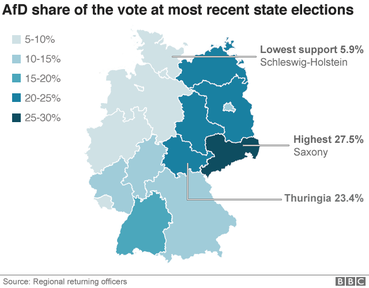On radicalization – Thomas O. Falk in Haaretz:
‘The Alternative for Germany is known today as a party of populists, where nativism and fascism are both rampant and ubiquitous. But the party has undergone a transformation since its formation in 2013, from what was initially a commitment to economic liberalism, Euroscepticism, and conservatism. The price that the now clearly far right, xenophobic AfD will pay is electoral oblivion.
Last week marked yet another Groundhog Day moment for the AfD. Party co-chair Jörg Meuthen quit over the party's political direction and its radicalization. Before Meuthen, his predecessors Bernd Lucke and Frauke Petry had also left. Meuthen gave a baldly explicit reason for his decision: Parts of the party don’t share common ground regarding "the free foundational democratic order."
Meuthen seems to have met his own red line when confronted with too many AfD members’ weak dedication to democracy. But his statement seems like an overdue protest: for years, the party has pursued a populist escalation strategy that has driven even mainstream political discourse within Germany, on refugees, immigrants and Islam, even further to the right.’
(…)
‘However, Meuthen’s attempt to pivot encountered strong opposition, particularly in the militantly far-right 'Flügel' (The Wing) faction, estimated to include around 40 percent of all AfD members, and which is based around the influential Thuringian state party chair Björn Höcke. The latter has become a symbol of the party's radicalization.
At the federal level, in the Bundestag, the AfD parliamentary group consists primarily of right-wing populist MPs whose performative politics are reminiscent of Republicans in Congress; they appear to have no profound interest either in opposition work nor in supporting the government. But at the local level, the situation is quite different.
In the eastern German states, since reunification the regions that are most susceptible to political extremism, the AfD is more than a mere nuisance to parliamentary work. It boasts a strong base and it functions as a safe haven for neo-Nazis and other radicals, characterized by antisemitism and the celebration of Germany’s Nazi past.’
(…)
‘However, the good news is that populism and extremism alone will not overcome the AfD’s utter lack of solid politics and a coherent agenda for Germany.
Granted, the AfD's recipe worked during the financial and refugee crises. However, its strategy has stopped working its magic. That was already evident during the COVID pandemic. Ignoring the virus and its fatal effects and embracing anti-vaxxers did not lead to the hoped-for increase in votes in the federal election but to a loss of votes instead.
The AfD has a failed business model. Its extremism precludes any option for holding genuine power, which is why the party will ultimately shrink to become an East German regional party and thus descend into irrelevance – precisely the scenario Meuthen sought to prevent.’
Read the article here.
Thomas O. Falk might be right, hopefully he is right, but we don’t know what crises are waiting for us in the near fortune and crises are still mostly an opportunity for radical political parties (and politicians) who can present themselves as outside the political mainstream.
As for example the rise of Trump made clear, the seemingly unelectable can become electable. The electorate is capricious, maybe less so in Germany, but the past becomes more and more past, also there.
